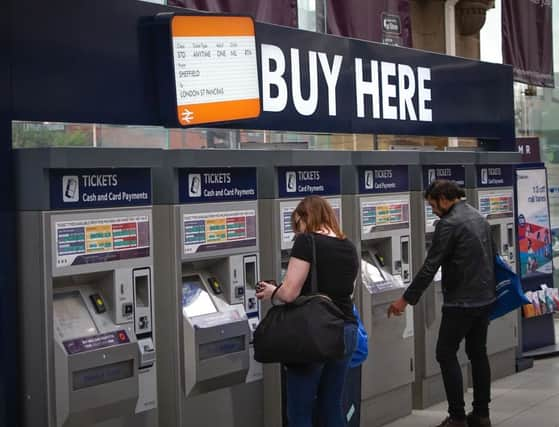This is how much train ticket prices could increase next year due to inflation


The Department for Transport (DfT) has announced that regulated rail fares will increase more than expected in 2021, with passengers hit by an above inflation fare rise for the first time in eight years.
Ticket prices are set to rise by 2.6 per cent, and while fare increases usually are put in place on the first working day of the year, the increase this time has been delayed until 1 March 2021.
Advertisement
Hide AdAdvertisement
Hide AdIn a statement, the DfT said that this delay offers “a significant window for commuters who cannot work at home to purchase cheaper season tickets at the existing rate and [allows] greater flexibility in uncertain times.”
The DfT also added, “The effect of this delay means that key workers and those using the network throughout 2021 will pay about the same across the year than if fares had risen by inflation at the usual time.
“Those renewing season tickets will be able to do so until 28 February 2021, getting up to a year’s travel at the old rates.”
Why are fares going up?
The government uses July’s Retail Prices Index (RPI) to measure inflation, and this determines the increase in the price of rail fares. This year, the government is using RPI+1 to set the fare increases.
Advertisement
Hide AdAdvertisement
Hide AdThis year, the RPI measure of inflation was 1.6 per cent, but since the government is using RPI+1, that sets the new measure of inflation at 2.6 per cent.
“Changes to the price of tickets reflect the need to continue investing in modernising the network, improving punctuality and reliability, and also recognises the unprecedented taxpayer support over the last 12 months,” the DfT said.
New fare price examples
These are 10 examples of possible rail fare rises across the UK. This table compares the price of a 12 month season ticket bought now with the one purchase from 1 March next year, following the 2.6 per cent increase.
It does not include the price paid if within-London travelcards are also purchased for Tubs and bus journeys in London.
Advertisement
Hide AdAdvertisement
Hide AdThe table goes Route > Current Price > March 2021 Price > The Increase:
- Woking to London > £3,440 > £3,529 > £89
- Brighton to London (any route) > £4,980 > £5,109 > £129
- Liverpool to Manchester (any route) > £2,692 > £2,762 > £70
- Neath to Cardiff > £1,808 > £1,855 > £47
- Whitehaven to Carlisle > £2,032 > £2,085 > £53
- Welwyn Garden City to London > £3,100 > £3,181 > £81
- Gloucester to Birmingham (any route) > £4,356 > £4,469 > £113
- Tweedbank to Edinburgh > £2,900 > £2,975 > £75
- Bagnor to Llandudno > £1,204 > £1,235 > £31
- Edinburgh to Glasgow (any route) > £4,200 > £4,309 > £109
‘Keeping vital services running’
Rail Minister, Chris Heaton-Harris, said, “Delaying the change in rail fares ensures passengers who need to travel have a better deal this year.
“Right now, our priority must be ensuring our transport network is safe for passengers and staff, and we urge members of the public to follow the government’s advice and only travel when absolutely necessary.
“By setting fares sensibly, and with the lowest actual increase for four years, we’re ensuring that taxpayers are not overburdened for their unprecedented contribution, ensuring investment is focused on keeping vital services running and protecting frontline jobs.”
Fare increase is ‘extortionate’
Advertisement
Hide AdAdvertisement
Hide AdManuel Cortes, general secretary of the Transport Salaried Staffs’ Association, described the increase in prices by more than inflation as “extortionate and plain daft.”
He said, “Given the massive economic fallout from the virus, the last thing we need to see is a kick in the teeth for passengers.”
Jacqueline Starr, chief executive of the Rail Delivery Group, which represents train operators, said that “passengers will be disappointed”, but added that “governments must ultimately decide the balance between how much fare payers and taxpayers pay to run the railway.”